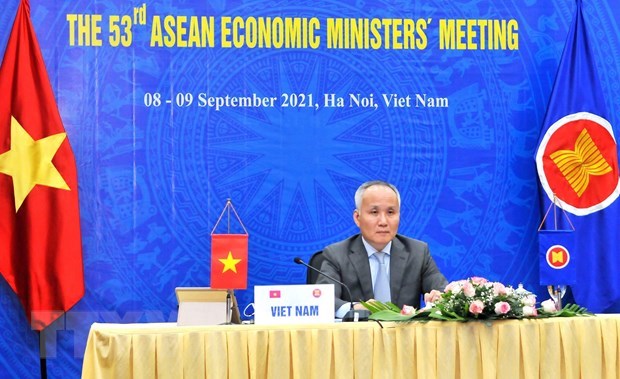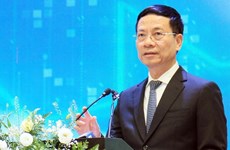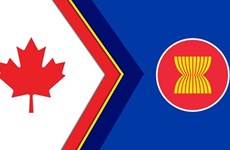Digital transformation roadmap endorsed at 53rd AEM Meeting
The Bandar Seri Begawan Roadmap on digital transformation to accelerate ASEAN’s Economic Recovery and Digital Economy Integration (BSBR) was endorsed during the virtual 53rd ASEAN Economic Ministers' (AEM) Meeting chaired by Brunei on September 8-9.
 Vietnamese Deputy Minister of Industry and Trade Tran Quoc Khanh at the event (Photo: VNA)
Vietnamese Deputy Minister of Industry and Trade Tran Quoc Khanh at the event (Photo: VNA) Jakarta (VNA) - The Bandar Seri Begawan Roadmap on digital transformation to accelerate ASEAN’s Economic Recovery and Digital Economy Integration (BSBR) was endorsed during the virtual 53rd ASEAN Economic Ministers' (AEM) Meeting chaired by Brunei on September 8-9.
The roadmap highlights existing ASEAN initiatives that are crucial in supporting the Association of Southeast Asian Nations (ASEAN)’s ongoing digital integration, turning the ongoing pandemic crisis into an opportunity through digital transformation.
The BSBR will build a resilient foundation for an ASEAN Digital Economy, where the seamless and secure flow of goods, services and data is underpinned by enabling rules, regulations, infrastructure and talent.
Under the BSBR, ASEAN members have also agreed to conduct a study on the establishment of an ASEAN Digital Economy Framework Agreement (DEFA) by 2023 and to commence negotiations on the DEFA by 2025.
The 53rd AEM Meeting noted that economic recovery across the region remains fragile, as gradual reopening in ASEAN members is disrupted by surges in COVID-19 cases with the rise of new variants. Nonetheless, the meeting welcomed that the economy is picking up, and gross domestic product (GDP) in Southeast Asia is expected to reach 4 percent this year and 5.2 percent in 2022.
As the region moves to sustain the momentum of recovery, the event recognised that vaccination remains the top priority, and continued fiscal and monetary stimulus are necessary to reinforce the economy.
It reaffirmed that support for the vulnerable groups, including informal workers, women, and youths, is important to minimise the development gap that has been amplified by the pandemic.
The event noted the implementation of the ASEAN Comprehensive Recovery Framework (ACRF) and its Implementation Plan, which serves as a consolidated exit strategy from the COVID-19 crisis through the five ACRF broad strategies around health, human security, economic integration, digital transformation, and sustainability.
It also endorsed the expanded list of essential goods that incorporates certain food and agricultural products into the Memorandum of Understanding (MOU) on the Implementation of Non-Tariff Measures on Essential Goods under the Hanoi Plan of Action on Strengthening ASEAN Economic Cooperation and Supply Chain Connectivity in Response to the COVID-19 pandemic that was signed by the AEM Meeting last November.
The meeting noted the progress of the endorsement of the post-COVID-19 Recovery Plan for ASEAN Tourism which will provide coordinated measures to be undertaken by member countries in a phased approach to safely reopen the industry while working towards a more sustainable, resilient, and inclusive ASEAN tourism./.
The roadmap highlights existing ASEAN initiatives that are crucial in supporting the Association of Southeast Asian Nations (ASEAN)’s ongoing digital integration, turning the ongoing pandemic crisis into an opportunity through digital transformation.
The BSBR will build a resilient foundation for an ASEAN Digital Economy, where the seamless and secure flow of goods, services and data is underpinned by enabling rules, regulations, infrastructure and talent.
Under the BSBR, ASEAN members have also agreed to conduct a study on the establishment of an ASEAN Digital Economy Framework Agreement (DEFA) by 2023 and to commence negotiations on the DEFA by 2025.
The 53rd AEM Meeting noted that economic recovery across the region remains fragile, as gradual reopening in ASEAN members is disrupted by surges in COVID-19 cases with the rise of new variants. Nonetheless, the meeting welcomed that the economy is picking up, and gross domestic product (GDP) in Southeast Asia is expected to reach 4 percent this year and 5.2 percent in 2022.
As the region moves to sustain the momentum of recovery, the event recognised that vaccination remains the top priority, and continued fiscal and monetary stimulus are necessary to reinforce the economy.
It reaffirmed that support for the vulnerable groups, including informal workers, women, and youths, is important to minimise the development gap that has been amplified by the pandemic.
The event noted the implementation of the ASEAN Comprehensive Recovery Framework (ACRF) and its Implementation Plan, which serves as a consolidated exit strategy from the COVID-19 crisis through the five ACRF broad strategies around health, human security, economic integration, digital transformation, and sustainability.
It also endorsed the expanded list of essential goods that incorporates certain food and agricultural products into the Memorandum of Understanding (MOU) on the Implementation of Non-Tariff Measures on Essential Goods under the Hanoi Plan of Action on Strengthening ASEAN Economic Cooperation and Supply Chain Connectivity in Response to the COVID-19 pandemic that was signed by the AEM Meeting last November.
The meeting noted the progress of the endorsement of the post-COVID-19 Recovery Plan for ASEAN Tourism which will provide coordinated measures to be undertaken by member countries in a phased approach to safely reopen the industry while working towards a more sustainable, resilient, and inclusive ASEAN tourism./.












